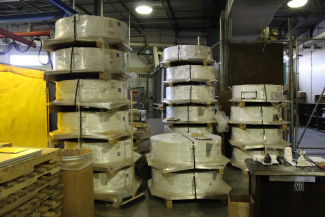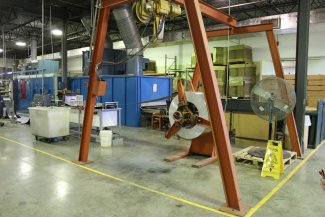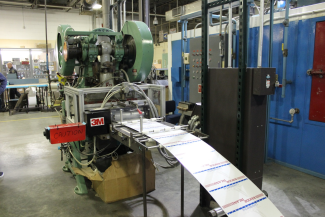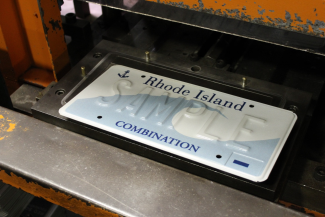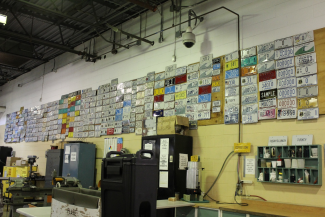Plate Shop
For decades, the Rhode Island Department of Corrections has partnered with the Rhode Island Division of Motor Vehicles (DMV) to produce all official state license plates. This long-standing collaboration is a key component of the Department’s correctional industries program. The license plate manufacturing operation was originally based at the Medium Security facility before relocating to its current home in the Industries Building at the Maximum Security facility.
The production process begins with large rolls of aluminum, which are fed into a blanking press to form flat sheets. These sheets are processed into long strips that match the specifications of Rhode Island license plates. The aluminum then moves through a cutting machine, where individual plate blanks are created.
Following this, each plate is passed through a high-pressure stamping machine that embosses it with the assigned alphanumeric characters. The stamped plates are then sent along a conveyor system through a two-stage oven—first heated, then cooled—to permanently bond the reflective coating and seal the plate surface. Once cooled, each plate undergoes a detailed inspection to ensure it meets quality and regulatory standards.
After final inspection, the completed plates are bagged, labeled, and prepared for shipment to the Rhode Island DMV for statewide distribution.
This production shop is staffed by approximately 20 inmates, all of whom participate in a structured vocational program. Inmates receive hands-on training in industrial manufacturing practices, including machine operation, materials handling, quality control, and preventive maintenance. Their responsibilities include operating cutting and stamping equipment, inspecting finished products for defects, and maintaining a clean and functional workspace. Inmates also learn essential workplace behaviors such as punctuality, accountability, following instructions, and working effectively in teams under supervisory direction.
In addition to technical skills, this program provides valuable real-world experience that helps prepare inmates for reentry into the workforce, fostering personal responsibility and supporting long-term rehabilitation through meaningful employment training.
